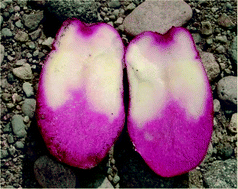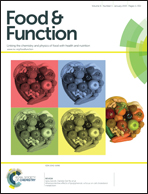Optimization of in vitro inhibition of HT-29 colon cancer cell cultures by Solanum tuberosum L. extracts†
Abstract
Secondary metabolites in potato have been reported to possess bioactive properties, including growth inhibition of cancer cells. Because potatoes are widely consumed globally, potential health benefits may have broad application. Thus we investigated growth inhibition of HT-29 colon cancer cell cultures by extracts from 13 diverse genetic breeding clones. Extracts from three pigmented selections (CO97226-2R/R, CO97216-1P/P, CO04058-3RW/RW) inhibited growth of in vitro HT-29 cell cultures more effectively than other clones tested. While inhibition was highest from pigmented selections and pigmented tuber tissue sectors, not all pigmented breeding lines tested had appreciable inhibitory properties. Thus, inhibition was not uniquely linked to pigmentation. Immature tubers had the highest inhibitory properties, and in most cases mature tubers retained very low inhibition properties. Flowers and skins inhibited strongly at lower extract concentrations. An extract consisting of 7.2 mg mL−1 cell culture medium was the lowest effective concentration. While raw tuber extracts inhibited most effectively, a few clones at higher concentrations retained inhibition after cooking. Heated whole tubers retained higher inhibition than heated aqueous extracts. While all aqueous extracts from the two tuber selections (CO97216-1P/P and CO97226-2R/R) inhibited HT-29 cell cultures, inhibition was significantly enhanced in purple pigmented tubers of CO97216-1P/P prepared cryogenically as liquid nitrogen powders compared to extracts from freeze dried samples. Upregulation of caspase-3 protease activity, indicative of apoptosis, was highest among the most inhibitory clone samples. The unique sectorial red pigment expressing selection (CO04058-3RW/RW) provided a model system that isolated expression in pigmented sectors, and thus eliminated developmental, environmental and genetic confounding.


 Please wait while we load your content...
Please wait while we load your content...